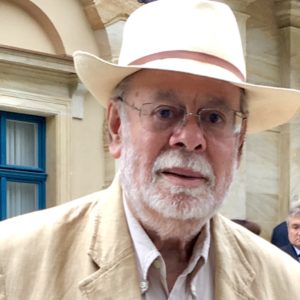Join us Saturday, October 5 at 6:30pm for The Gender and Politics of Arthur Miller’s 1950s with Stephen Nissenbaum.
When Arthur Miller first wrote The Crucible he meant for the play to be used as an allegory for the era of McCarthyism in the United States. However, what other aspects of the time made their way into the play?
In this symposium, scholar Stephen Nissenbaum will be addressing the gender politics of the 1950s and how they make an appearance in the text of the play. More specifically, he will discuss how Miller’s indictment of politics may have been weakened by the author’s acceptance of conventional assumptions about women and sexuality.
This program is funded in part by Mass Humanities, which receives support from the Massachusetts Cultural Council and is an affiliate of the National Endowment for the Humanities.
 Stephen Nissenbaum is professor of history emeritus at the University of Massachusetts at Amherst and adjunct professor of history at the University of Vermont. His books include The Battle for Christmas; Sex, Diet, and Debility in Jacksonian America; and Salem Possessed: The Social Origins of Witchcraft (published in 1974 and co-authored with Paul Boyer). Salem Possessed was a finalist for both the National Book Award and the Pulitzer Prize (His book about the Christmas was also a Pulitzer Prize finalist.) Since his retirement, Nissenbaum has radically shifted his research: he has been writing about the composer George Frideric Handel, especially about the cultural politics of Handel’s great oratorio Messiah. Nissenbaum lives in northern Vermont.
Stephen Nissenbaum is professor of history emeritus at the University of Massachusetts at Amherst and adjunct professor of history at the University of Vermont. His books include The Battle for Christmas; Sex, Diet, and Debility in Jacksonian America; and Salem Possessed: The Social Origins of Witchcraft (published in 1974 and co-authored with Paul Boyer). Salem Possessed was a finalist for both the National Book Award and the Pulitzer Prize (His book about the Christmas was also a Pulitzer Prize finalist.) Since his retirement, Nissenbaum has radically shifted his research: he has been writing about the composer George Frideric Handel, especially about the cultural politics of Handel’s great oratorio Messiah. Nissenbaum lives in northern Vermont.
Moderated by Dr. Martin Blatt
 Marty Blatt has served as Professor of the Practice and Director of the Public History Program at Northeastern for the last five years. He coordinated bringing the Humanities Action Lab exhibit, States of Incarceration, to campus. Blatt is a board member of the Northeastern Humanities Center and part of the University Holocaust and Genocide Awareness Committee. Blatt was Curator of the exhibit, Long Road to Justice – African Americans and the Courts, on permanent display at the Brooke Court House. He serves on the Bostonian Society Interpretation Committee and on the Historian Advisory Board of the Freedom Trail Foundation. In spring, 2020, with the support of MASS Humanities and the New England Humanities Consortium, he is collaborating with the Massachuset Tribe to organize a public reading of William Apess’s Eulogy to King Philip. Blatt worked for the National Park Service in Boston and Lowell for twenty-four years as a historian and cultural resources manager. In 2013, he conceived and coordinated the historical pageant in Boston, “Roots of Liberty: The Haitian Revolution and the American Civil War.” Dr. Blatt has served as President of the National Council on Public History, on the Executive Board of the Organization of American Historians, and on the Board of MASS Humanities. Blatt’s museum credits include exhibits at Old South Meeting House and the Battle of Bunker Hill Museum, and a traveling exhibit on the Gulag, produced by the National Park Service, the Gulag Museum, and Amnesty International.
Marty Blatt has served as Professor of the Practice and Director of the Public History Program at Northeastern for the last five years. He coordinated bringing the Humanities Action Lab exhibit, States of Incarceration, to campus. Blatt is a board member of the Northeastern Humanities Center and part of the University Holocaust and Genocide Awareness Committee. Blatt was Curator of the exhibit, Long Road to Justice – African Americans and the Courts, on permanent display at the Brooke Court House. He serves on the Bostonian Society Interpretation Committee and on the Historian Advisory Board of the Freedom Trail Foundation. In spring, 2020, with the support of MASS Humanities and the New England Humanities Consortium, he is collaborating with the Massachuset Tribe to organize a public reading of William Apess’s Eulogy to King Philip. Blatt worked for the National Park Service in Boston and Lowell for twenty-four years as a historian and cultural resources manager. In 2013, he conceived and coordinated the historical pageant in Boston, “Roots of Liberty: The Haitian Revolution and the American Civil War.” Dr. Blatt has served as President of the National Council on Public History, on the Executive Board of the Organization of American Historians, and on the Board of MASS Humanities. Blatt’s museum credits include exhibits at Old South Meeting House and the Battle of Bunker Hill Museum, and a traveling exhibit on the Gulag, produced by the National Park Service, the Gulag Museum, and Amnesty International.
